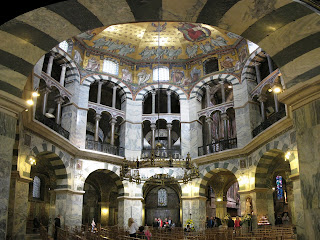Here you have the presentation (if it asks you to log in, use your educa.jcyl.es access data).
Unit 1 etiketine sahip kayıtlar gösteriliyor. Tüm kayıtları göster
Unit 1 etiketine sahip kayıtlar gösteriliyor. Tüm kayıtları göster
5 Ekim 2021 Salı
29 Eylül 2021 Çarşamba
4º - Enlightment videos - Unit 1
Hi,
Here you have the 2 videos... so you can wacht it at home paying attention... (you can activate subtitles in ENGLISH...).
The first one is about the Enlightenment philosophers:
And the second one about one of them, Rousseau: Click here to watch it.
Here you have the 2 videos... so you can wacht it at home paying attention... (you can activate subtitles in ENGLISH...).
The first one is about the Enlightenment philosophers:
And the second one about one of them, Rousseau: Click here to watch it.
25 Ocak 2021 Pazartesi
Example on how to interpret a work of art
Hi guys!
I share with you an example of commentary of a work of art... This one is an example from Unit 1 and the method is valid for all the year.
How to interpret an object/ picture/ work of art...
You should follow these steps:

I share with you an example of commentary of a work of art... This one is an example from Unit 1 and the method is valid for all the year.
How to interpret an object/ picture/ work of art...
You should follow these steps:
1- What is it? It is a sculpture, it’s a capital from a column inside a church. It belongs to San Pedro de la Nave, Zamora.
2- Who did it? or Which civilization? It is from the visigothic style in the Iberian Peninsula.
3- Which is its approximate date? It was made about the end of the 7th century.
4- How is it? (form, material, decoration, theme...) It is made from stone, it is part of a column, and the sculpture is on relief, adapted to the architectural element. This is a scene from the Bible, a religious theme, depicting the sacrifice of Isaac. It is very clear, designed for the people, who were illiterate in those days, to easily understand it.
5- What information from the past does it give us? (facts, government, population...) In the Visigothic kingdom, in the medieval era of history, churches were small, and used the decoration in order to teach people about christianity.
6- What was it used for? (function) Churches were a place to pray, and capitals were an element of the architecture, part of the column and therefore a support element. The real function of the decoration in this capitals was to show people the scenes of the Bible in a simple form.
21 Ekim 2020 Çarşamba
1 Ekim 2020 Perşembe
29 Eylül 2019 Pazar
Project 1 - Unit 1 Art
Each group will present to the class their work in a speaking presentation.
You can use different resources (storyteller, narrator, online presentations, videos, poster...).
You have to choose and divide the different parts, so each member of the group participe equally.
GROUP 1 - GOYA
Ideas:
Biography
Work by stages: 1- First years (Zaragoza). 2- Tapestry cartoons (Madrid), 3-Portraits (Madrid), 4- Last works (History paintings, black paintings)
GROUP 2 - NEOCLASSIC MADRID
Ideas:
Carlos III - role
Tourist guided route: different monuments in Madrid made in that period, in neoclassic style (for example the Prado museum, the Puerta de Alcalá, the Royal Observatory, the Royal Botanic Gardens, the Basilica of San Francisco el Grande...
You can use different resources (storyteller, narrator, online presentations, videos, poster...).
You have to choose and divide the different parts, so each member of the group participe equally.
GROUP 1 - GOYA
Ideas:
Biography
Work by stages: 1- First years (Zaragoza). 2- Tapestry cartoons (Madrid), 3-Portraits (Madrid), 4- Last works (History paintings, black paintings)
GROUP 2 - NEOCLASSIC MADRID
Ideas:
Carlos III - role
Tourist guided route: different monuments in Madrid made in that period, in neoclassic style (for example the Prado museum, the Puerta de Alcalá, the Royal Observatory, the Royal Botanic Gardens, the Basilica of San Francisco el Grande...






